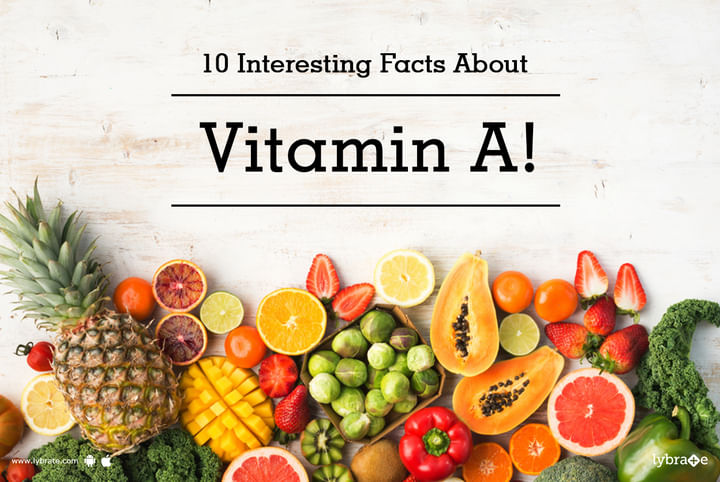Get the App
For Doctors
Login/Sign-up
Last Updated: Nov 14, 2020
BookMark
Report
10 Interesting Facts About Vitamin A!
Dt. Rajat JainDietitian/Nutritionist • 9 Years Exp.Diploma In Diet & Nutrition, Post Graduate Diploma in Clinical Nutrition & Dietetics
Vitamin A is essential for various body functions and the most important are vision, immunity, skin & hair health and correct genetic transcription. Signs of Vitamin A toxicity include bone pain, brittle nails, hair loss, fatigue, dry and fissured skin and abnormal liver function. Deficiency of Vitamin A leads to night blindness.
Some interesting facts about Vitamin A:
- Vitamin A is a fat-soluble Vitamin, thus requires fat for effective absorption.
- Normal level of Vitamin A required for proper body functioning is about 3000 mg per day. A person could also end up eating more of Vitamin A on a regular basis, which could lead to Vitamin A toxicity. If it is consumed from natural sources, it is not harmful; however, if synthetic Vitamin A is consumed, it may end up as a toxin in the body.
- Every 100 g of sweet potato contains about 19200 IU of Vitamin A. Sweet potato can be consumed in cooked, baked, cubed, raw or frozen form. It can be used in multiple ways and is one of the most Vitamin A rich foods.
- Carrots are the most popular and rich source of Vitamin A. Every child knows that carrots are good for vision and eye health. Carrots can also be consumed in baked, cooked, raw or frozen form. Every 100 g of carrot contains about 17000 IU of carrot, which takes care of daily requirements.
- Green leafy vegetables are another rich source of Vitamin A. This could be spinach, lettuce, beet greens, turnip greens, collards, kale, or other greens. Each of them contains sufficient amounts of Vitamin A, and including about 100 g provides about 14000 IU of Vitamin A. These can be used as salad dressings or cooked with lentils to make a variety of dishes.
- The liver from any animal is the most effective nonvegetarian source of Vitamin A. Consuming liver 2 to 3 times per day gives sufficient amounts Vitamin A for men, women and children. Cod liver oil, which is available widely in the market is also a good source, if meat is not available.
- Dry fruits, such as apricots, which are sundried and used when there is no season for apricots, are another rich source of Vitamin A. Dried peaches and prunes are also good sources for this Vitamin.
- Consuming about 2 egg yolks per day provides all the required Vitamin A for your body. It does contain cholesterol, but the body does need small amount of cholesterol too for various functions.
- Dairy products, such as butter and cream from cow's milk which are especially fed on grass are again great sources of Vitamin A.
- Small amounts of Vitamin A are also present in cantaloupe melons, pumpkins, squash fruits, beetroot, bell peppers and most importantly in seasonal fruits.



+1.svg)
